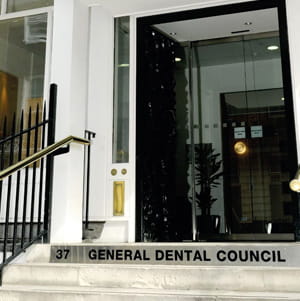
THE General Dental Council has certainly had its woes over the last few years, facing sustained criticism from the British Dental Association along with a Health Select Committee accountability hearing into failings. This included written evidence from the Professional Standards Authority (PSA) describing the organisation as worse than seven of the eight professional regulators it oversees. Not to mention the near unanimous ire of dentists in 2015 over a 54 per cent rise in its annual retention fee.
But are things finally starting to look up?
A new 2016 PSA review published last month found that the GDC is now meeting 21 out of 24 Standards of Good Regulation – up from the 15 met in 2015. Even the BDA has grudgingly acknowledged some obvious improvement.
Chair Mick Armstrong said: “The General Dental Council has a mountain to climb to cast off its reputation as Britain’s least effective and least efficient health regulator.
“This profession acknowledges signs of progress, but the GDC has no grounds for complacency. Today a dentist is still expected to pay more than any other healthcare professional for a regulator that still cannot provide an adequate fitness to practise function.”
Here he seems to be referring to the three standards where the regulator is still deemed as wanting – all of which are to do with the way the GDC handles concerns over a registrant’s fitness to practise. More specifically the PSA is still not satisfied with the time it takes for the GDC to review fitness to practise complaints and prioritise serious cases for referral to an interim orders panel (to consider whether registration should be suspended or made subject to conditions while an investigation is ongoing). The PSA also noted a continued failure to fully explain the reasons for particular decisions in some fitness to practise cases, as well as concerns over data protection.
But the PSA report does acknowledge the regulator’s efforts to improve: “The GDC has made clear in this performance review year that it understands there is considerable work to do for it to resolve the issues that have led to it failing to meet Standards in previous reviews. The GDC has engaged positively with this task and, as a result, has demonstrated that it has made significant progress this year.”
A recent change in the way the regulator operates should lead to even further improvement in coming years. In November the GDC began using case examiners to assess complaints against registrants. This means cases will now no longer be referred to an investigating committee for a decision but will instead be considered by a pair of case examiners (one lay and one clinical) who will look at the evidence gathered during an investigation and utilise a suite of outcome options, for example, issuing a warning or taking no further action and closing the case.
Only those cases with a realistic prospect of an impaired fitness to practise finding will be referred for a hearing before one of three practice committees (conduct, performance and health). Essentially case examiners will conduct a “filtering process” but will also have the option at any point in an investigation to refer a serious case to an interim orders committee.
There will also be the option of offering “undertakings” – agreeing steps that need to be taken to bring a registrant up to the required standard. This may include further training or prohibiting certain aspects of treatment until additional training has been completed. Practitioners will be supported and encouraged by the GDC to improve for the duration of the undertakings.
Jonathan Green, Director of Fitness to Practise at the GDC, said: “Introducing case examiners will benefit patients, the public and dental professionals and improve the efficiency of the GDC’s fitness to practise process.
“By not having to frequently convene an investigating committee, we will be able to make decisions quicker than before which benefits patients. We can take action straight away to support the dental professional to improve his practise. This new way of working is also more cost effective, and at the same time relieves unnecessary stress to the dental professional.
“Where a professional demonstrates insight into their failings, remorse and a desire to remediate, we now have a mechanism to be much more proportionate and to agree undertakings in suitable cases without having to hold a full hearing.
“We only want to deploy our investigatory and prosecuting powers where they can make a difference to patient safety and protect public confidence in dental services, which inevitably will be in only the most serious and complex cases.”
Jim Killgore is an associate editor of SoundBite
This page was correct at the time of publication. Any guidance is intended as general guidance for members only. If you are a member and need specific advice relating to your own circumstances, please contact one of our advisers.
Read more from this issue of Insight Primary

Save this article
Save this article to a list of favourite articles which members can access in their account.
Save to library